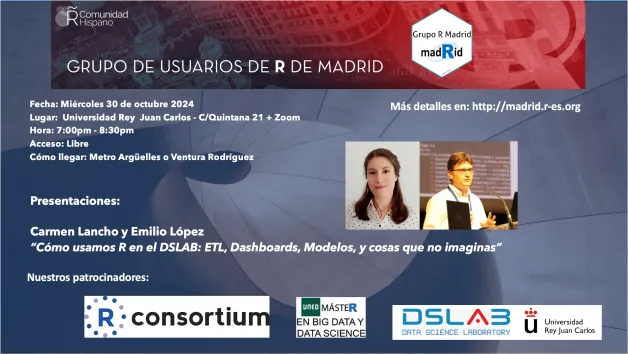The DICYME project is not only dedicated to developing cutting-edge tools for cybersecurity risk assessment but also emphasizes knowledge transfer and dissemination of results. A significant example of this commitment was the recent talk at the Madrid R Users Group, where Emilio López, a researcher from the university team of the DICYME project, presented real-world applications of R in the DSLAB (Data Science Laboratory) at Rey Juan Carlos University (URJC).
R in cybersecurity: from research to practical applications
One of the highlights of the session was the discussion of how R is leveraged within the DICYME project to develop impactful applications. A key case study was the DICYME web application, which consists of a Shiny-based visualization platform. This app enables users to explore datasets, analyze cybersecurity indicators, and calculate cyber risk using advanced statistical methods.
Moreover, this R app has been enhanced and strengthened with several key technological advancements: database integration has improved data accessibility and efficiency, while Docker container deployment ensures consistency and ease of scalability. Additionally, continuous integration (CI) pipelines have been implemented to automate deployments and enhance reliability. Code quality control (linting) has also been introduced, ensuring standardized and maintainable code. These improvements contribute to a more robust, scalable, and efficient cybersecurity platform built with R.
Another noteworthy mention was CRAS (Cybersecurity Risk Analysis and Simulation Shiny app), a project derived from DICYME, designed to execute cybersecurity simulations for both analytical and educational purposes. CRAS follows a similar structure and methodology, reinforcing the synergy between R, cybersecurity, and risk modeling. This project has also been presented at prestigious conferences, including the useR! Conference, held in Salzburg in July 2024, and the III Congress and 14th Conference of R Users, which took place in Seville in November 2024.
Expanding the impact of DICYME through R
The use of Shiny and R-based microservices in DICYME highlights the versatility of R for cybersecurity applications, ranging from data exploration to predictive modeling. The project has successfully demonstrated how academic research can be translated into practical, real-world tools that benefit both the industry and academia.
By sharing these insights at the Madrid R Users Group, the DICYME team contributes to the broader community, ensuring that the methodologies and tools developed within the project can be replicated and expanded by other researchers and professionals in the field.
